I'm a firm believer that technology becomes a musical instrument in the hands of a creative person (or group) that adopts it, stretches the boundaries, and makes compelling music that couldn't be made without it. Once that happens other creative people are drawn to the technology to emulate what they are hearing from the artist. Where would the organ be without J.S. Bach, or the electric guitar without Les Paul and Jimi Hendrix.
Though the computer is now the technology of choice for recording music, it is still at the tip of the iceberg in terms of a musical expression. That being said, more and more music is appearing that can't be done without it. In contrast to the three aforementioned artists more of the virtuosity of this music is in the preparation rather than the execution.
The Crystal Method has been doing this since the early 90s. The band is made up of two members, Ken Jordan and Scott Kirkland. Before The Crystal Method was formed Scott developed his style while working at a grocery store while Ken was a local DJ in Las Vegas as well as the college radio program director at UNLV. Ken taught Scott how to DJ, and when Ken moved to L.A. to work for a producer, Scott took over his job DJ'ing at the local club. Scott would subsequently follow Ken out to L.A., and they formed The Crystal Method in 1993.
Starting with purposed hardware synthesizers and samplers they used the computer for recording initially, but over time, as newer software applications came on the market, it changed their approach and the music they made.
I jumped at the chance to talk to them because they embody creativity with technology. As with an artist playing more traditional instruments listening to their music makes you want to try to figure out what they are doing.
You are from Las Vegas. Is that where you guys grew up?
We are. I was born there. We both grew up there and then moved to LA around 1990.
Vegas is not exactly a music Mecca like Memphis or Detroit or the kind of place where musical styles are born....
Right. There was no style or culture in Las Vegas. We kind of liked a lot of things. It was so different from what it is now. When we were growing up there, Vegas was catering to retired people. It was when Frank Sinatra was still there. This was before they went to the "family" thing and eventually went to the "young adult" thing. There were no venues for original, live music. There was no way for original music bands to survive. There were just cover bands and lounges. The only good thing we had there at the time was the college radio station.
Did you play in those kinds of bands? Cover bands and things like that?
No, I actually had no aspirations to be in a band, ever, until I was in this band. So I was working as music director and program director at KUNV, the college radio station. A couple of local bands asked me to go in the studio with them because they liked my taste in music and so from the first time I went in there I was like, "Oh, this is what I want to do.".
The University had a recording studio and they had some classes, but they didn't have any degree programs. So I just took all of the electives I could in that and graduated and got my degree (in Communications) and left and went to LA.
What music did you play on your radio show?
In Vegas there was no Live 105 or KROQ like in LA. We played typical '80s college rock like, REM and all of that stuff. Also a lot of New Order, Depeche Mode, and Public Enemy and stuff. Anything kind of cutting edge, we played. And we were the only outlet for it. It was a full-power station and you'd hear it all around the city so we had a pretty good listenership.
Do you have any formal music training on a traditional instrument?
Well, when I was a kid I took a couple of semesters of piano. But I'm a horrible piano player. I'm pretty good on keyboards and a decent guitar player, but I'm not a very good musician at all. Scott is a player though.
The kind of music you guys do, there's a lot of virtuosity that happens behind the scenes. How do you make the transition to live performance?
It's interesting because when we started out, before we played our first live show, we'd build these raves or whatever and see when these acts were performing and just say, "Man, where's the performance?" It'd just be a guy standing behind things. In our first performances, we tried to, the best we could with this style of music, kind of show what we were playing. So we would make different live versions of all of the tracks that we would play live and play all of the key parts the best we could. So to at least give some live performance element to it. So we still do that when we play live.
What sort of gear did you have when you started?
The first two keyboards we had were the Ensoniq Mirage and the Ensoniq ESQ-1. That was a little less; it was the cheapest you could get. The ESQ-1 was very good actually. It was multi-timbral and that worked well with the former. The Mirage was just a total piece of crap. My partner, Scott, he got his parents to spend more money and got an Emu Emax. It was, like, 13-bit...
They were pretty expensive at the time....
They were three grand, where the Mirage was normally $1000, maybe $1600 or something like that. But the difference was just unbelievable.
What you sampled into the Emax sounded like what you sampled into it. The Mirage sound was nothing like what you sampled. It's hilarious. I mean, the Mirage was good for interesting sounds, but not for playing back samples.
Scott also had a Roland D-50, but we didn't have a computer. Instead he used the Alesis 8-track sequencer. I think it was called the MMT-8. It looked the same as their drum machine.
You know, our first album, "Vegas"... (Enthusiastic 'yes') We combined our gear and set up a little mini studio in Vegas. The most we ever had on that album was seven digital tracks, seven recorded tracks at a time. One for sync, and then we'd have thirty tracks of live MIDI running for the mix. I'd try to bounce as much as I could, but back then storage was so precious and expensive, you know? I remember getting that 44 MB, big cartridge drive and just thinking, "Wow! That's so much storage, I'll never need more.".
On "Trip Like I Do" (first cut on Vegas), what is that groove synthesizer?
That is a Yamaha CS40. We also have a CS80.
Do you take that on the road?
Our friend, Jon Brion, he's an amazing musician. He's got our CS80. But the Yamaha CS40, they made a few of those in the CS series and we still fire it up and that sound is still there.
You guys do a lot of collaborations, but it seems like mostly with singers. Have you done any collaborating with an instrumentalist?
Well, we've worked with Tom Morello, from Rage (Against the Machine). He hasn't performed live with us yet, but we're working on it to try and get him to go out next summer. That would be great. On stage, it's only been singers, pretty much.
When did you start using a computer?
At our studio in LA, everything is Pro Tools, but we also use Ableton Live. We use it a lot on our laptops at home and we'll prepare our radio show mixes and stuff with Ableton Live. But when anything gets to where it's a project we're wanting to finish, it gets transferred to Pro Tools.
What do you use for hardware controllers?
We're using the Novation SL MK II. We've got the 25-key and we really like it. The thing that really sold us on it... I mean, it's a really good controller, but the thing that way sold us on it was Automap. We didn't know what it was until a few months ago, so we're really enjoying that now.
How do you develop your beats these days?
We're using this program called Geist from FXpansion in every track we do. Whether or not the track starts in Ableton Live or in Pro Tools, we use Geist a lot. It's my partner's favorite new thing. It's just so infinitely deep and you can do so many things. You can tell it, "This is a kick, this is a snare..." and a bunch of others.
Does learning a new application as deep as Geist ever seem overwhelming?
It's all overwhelming. And I don't want to think about whether it's overwhelming, or I'll be overwhelmed.
I think Geist is best used standalone, but we typically use it as a plug-in. We'll use it as a standalone sometimes. We're mostly using it for beats but it's not just for beats, you know.
Do you trigger it from any particular piece of hardware?
Mostly we're just mouse-clicking it.
Do you use any other unusual techniques in creating beats?
Yeah, one thing we've been doing lately is partly unusual but very old. I don't like MIDI clock sync. It's like basically you're saying, "Here's the beat, here's the beat, here's the beat..." and it's kind of reclocking every beat, you know? So what I've found is like, we have a lot of old analog gear, so what I'll do from Pro Tools or __ is I've got three sets of click tracks: one eighths, one sixteenths, and one quarters. And then I'll send that out to the clock input on the synths and then use the CV/Gate? on the old synth and the lock is just far beyond anything you've ever heard. It's just so right, and then we just record audio straight from that and cut it up later.
When you are using soft synths, do you guys start from scratch generally or do you use patches and tweak them?
With something like DCAM (also from FXpansion) that's whole family of plug-ins, it's really easy to make your own patches. We generally do start with one of the patches and work from there. But it's pretty easy to radically change things in those programs.
Given the number of soft synths that are on the market today and given that you must have a museum full of analog gear, which do you tend to go for first when you've got ideas?
We have a few go-to synths that we really like the sound of. I don't know of any virtual synths yet that really have that sound of overdriving analog filter or getting that real low-end that only analog synths can have. So when we're looking for those kinds of sounds, we like to go with the original synths.
What are the "go to" analog synths?
Memorymoog we use a lot. Jupiter 6. Jupiter 8. We've never had a 303, but we had this other analog box, called Future Retro 777. It's 10 years old and it is magnificent. We still have a Roland SH 101 that sounds great.
Now having said all of that, we still have lots of other gear that we want to use so badly but every time we try to pair it on, there's some thing that's wrong with it. And we have to send it somewhere and spend tons of money and it comes back and still doesn't really... so the thing with the virtual instrument is that you select it, and it works perfectly. The plug-ins work much better than the old hardware systems, definitely.
The Martha Reeves' collaboration, how did you approach that versus doing your own songs?
We actually approached it very similar to the way we normally work. So we sort of had a target date way off in the future when we knew we were going to go to Detroit. We had to have some track built up by this certain time and we weren't going to work with Martha until then. So from that point until we got to Detroit, it was just like making one of our tracks.
They approached us and suggested some names and genres and so forth. So we had the track pretty well built up, minus vocals, lyrics, background, before we got to Detroit. We wrote lyrics and verses, in Detroit, the night before we went into the studio with Martha, and we didn't use any of those. Which ended up being good, it ended up being good film. She didn't like some of the stuff or we had to work on some of the stuff with her in the studio under pressure. It was a hectic day.
But the big hook background vocals and choruses, we did all of those backgrounds after the fact in LA. We had taken one line of Martha singing and sort of said, "This is the hook here." 'I ain't going nowhere.' So we took that and put it every four bars and then brought in some background singers and worked the hook around that.
So you went to Detroit and did that, but then you came back and sort of finished it up...?
Finished it up with just the big chorus section. We'd recorded some backgrounds in Detroit that we didn't use and we redid that whole part and then the final mix.
So if you had to name three artists, musician acts, that you really enjoy that are not in the genre that you are in, who would you mention?
I like Muse. Oh man, I saw those guys at Coachella. I love their music and I love their records. Those guys played that record perfectly while running and jumping through the air. It was mind-blowing to me. Who else do I really love? I like old Stevie Wonder, really '70s Stevie Wonder. And then this other act, that's a little bit in our genre, but Massive Attack. I love Massive Attack.
And if you had to pick three artists that are closer in the electronica realm?
I really love Wolfgang Gartner, who's from Central Coast, California, which is basically where my parents grew up. And this guy, I don't even know where he's from. It's Dyro. He's new and fantastic. And, uh...who else is great now? These guys aren't that new, but everything they do is great, is Far Too Loud.
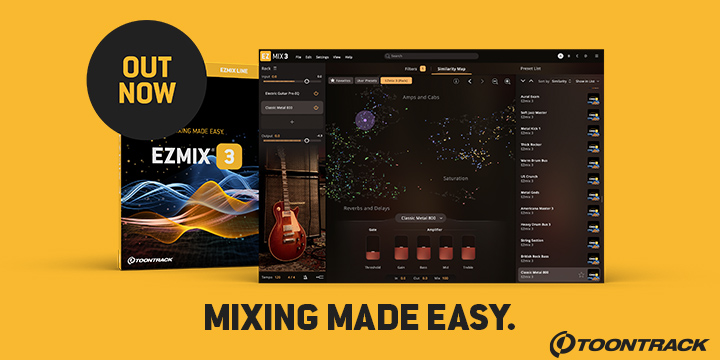
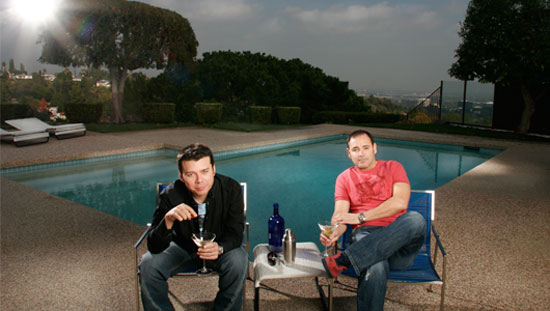

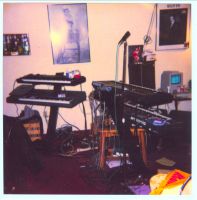
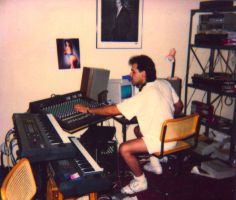
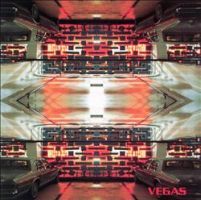
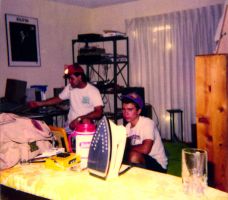
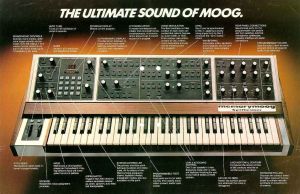
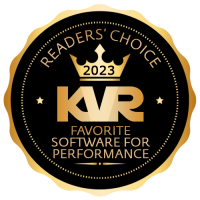

 Other Related News
Other Related News